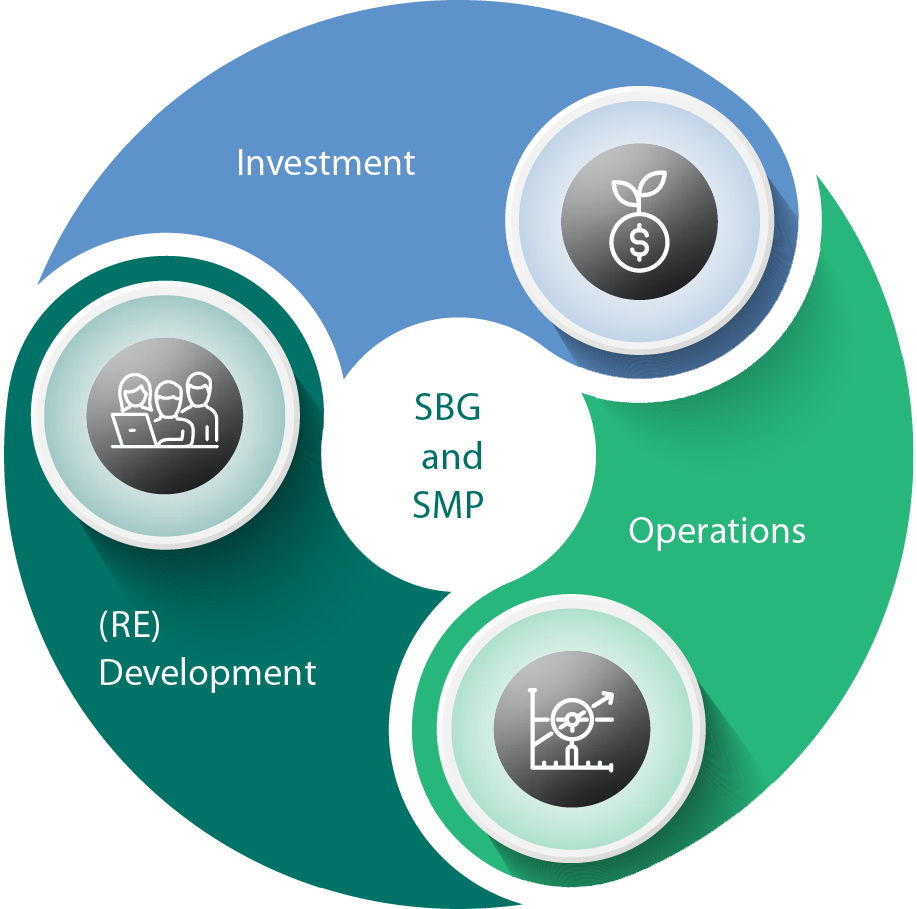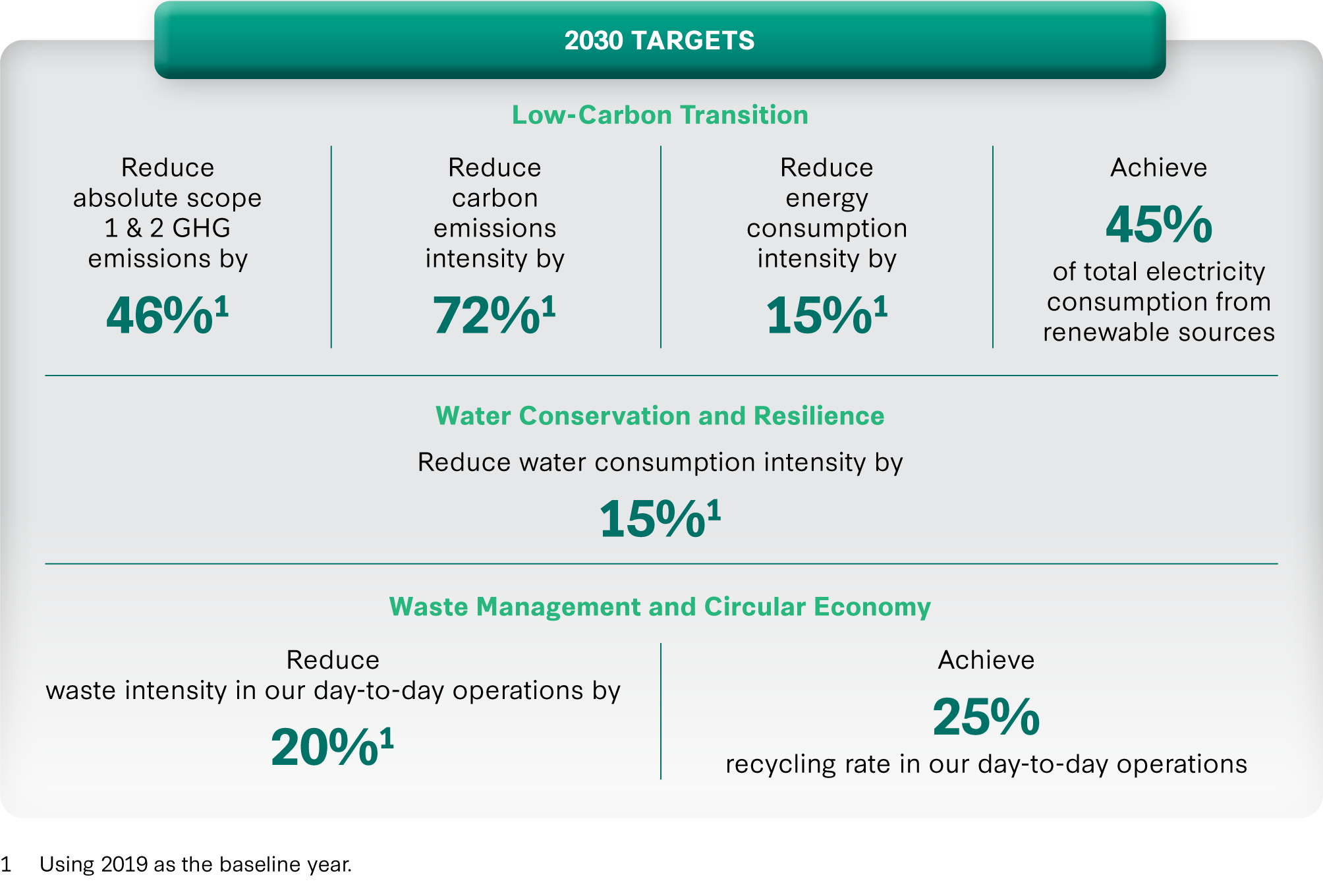Sustainability
ESG Focus
Environmental
CICT is committed to environmental sustainability and value creation by leveraging technologies, tools, education and analytics in optimising the usage of energy, water and waste management across our properties.
Read the full report about CICT’s Environmental in our Sustainability Report 2023 here.
Framework
- Global greenhouse gas (GHG) emissions at unsustainable level
- Cost pressure from rising demand for energy
- Water scarcity, accessibility and security
- Waste generation at unsustainable rates
- Cost pressure from resource scarcity
- Interdependence between the natural environment and well-being of the community
- Build resilience for the portfolio against the physical impact of climate change and prepare for changing regulations toward a low-carbon economy
- Reduce carbon emissions and transit to low-carbon operations
- Reduce energy consumption and transit to renewable energy sources
- Reduce water consumption and encourage use of treated/recycled water and rainwater harvesting
- Minimise generation of waste and increase rate of recycling for collected waste
- Manage biodiversity to minimise impact to the natural environment
- Engage stakeholders to adopt environmentally sustainable behaviours
CICT leverages CLI's Environmental Management System (EMS) in managing its environmental footprint across its portfolio. The EMS is integrated with the Occupation Health and Safety Management System to form a comprehensive EHS Management System (EHSMS). The EHSMS is audited by a third-party accredited certification body to ISO 14001 and ISO 45001 standards. ISO 14001 and ISO 45001 are internationally recognised standards for the environmental management of businesses and occupational health and safety management of businesses, respectively. CLI's EMS offers a systematic approach to effectively manage and continuously enhance the environmental performance of CICT's portfolio. It plays a crucial role in identifying and managing significant environmental aspects of business operations that could adversely affect the environment. To assess the significance of each environmental aspect and its impact, the EMS employs a rigorous risk assessment methodology. This method considers various factors including the probability of occurrence, the severity of potential impact, and the implementation of appropriate control measures, ensuring a comprehensive and proactive approach to environmental management. All staff are involved in reducing CICT's environmental footprint. They are encouraged to be forthcoming and to report all incidences of environmental-related issues and complaints, as well as incidences of non-compliances and non-conformities.
| Align to CapitaLand Environmental, Health and Safety (EHS) Policy | |||
|---|---|---|---|
| As an international corporate social citizen, CLI is committed to protecting the environment and upholding the occupational health and safety of everyone in the workplace and will: | |||
|
|
|
|
|
CapitaLand’s SBG is an in-house guide developed since 2007 to ensure environmental considerations are factored in all stages of a project, from feasibility, design, procurement, construction, operations to redevelopment. It covers new acquisitions, developments and refurbishments, as well as joint venture developments where CICT has management control. The SBG is regularly reviewed to ensure continuous improvement, with a focus on four key objectives of minimising carbon footprint and energy consumption, water management, reducing the generation of waste, and promoting biodiversity in the real estate life cycle.
Embedding targets for low-carbon transition, waste management and circular economy, water conservation and resilience, accessibility, healthy and safe building and supply chain management throughout the real estate life cycle


#1 Investment
- Align with CLI 2030 SMP
- Conduct Environment and Social Impact Assessment (ESIA), including the application of an internal carbon price
- Quantify proprietary Return on Sustainability (ROS)
#2 Operations
- Align asset planning with 2030 SMP targets
- Sustainable operational excellence, including sustainable procurement practices to meet the 2030 SMP targets
- Testbed innovations and collaborate with partners
- Track, evaluate and disclose performance
#3 (Re) Development
- Design in accordance with CapitaLand's SBG to meet the 2030 Sustainability Master Plan (SMP) targets
- Testbed innovations and collaborate with partners
- Track, evaluate and disclose performance

Training of staff and stakeholder engagement
A key component of the SBG is the mandatory ESIA. An ESIA is carried out during the feasibility study phase for investments in operational assets or redevelopment projects as part of due diligence. This involves establishing the baseline environmental performance such as energy efficiency and comparing it against our 2030 targets. The assessment also includes transition and physical risks and opportunity considerations, as well as the application of an internal carbon price. This assessment would guide the businesses to consider EHS risks and opportunities upfront and identify mitigation measures earlier. The significant findings of the ESIA and their cost implications are incorporated in the investment paper submitted to CICT’s Board for approval.
- CEO of the Manager and the CEOs of the Business Units (BUs) are Sustainability Champions
- ISO 14001-certified Environmental Management System (EMS) ensures accountability of all staff
- Key performance indicators (KPIs) are linked to remuneration of all staff; performance is tracked and disclosed regularly
- Ensure regulatory/legal compliance
- Identify environmental aspects and manage impact
- Adopt Sustainable Building Guidelines – includes the Environmental, Health & Safety (EHS) Impact Assessment – in consultation with stakeholders
- Require and indicate preference for ISO 14001 contractors/vendors and set environment targets/requirements in the procurement of products and services
- Ensure environmentally sustainable operations by implementing EMS Standard Operating Procedures (SOPs)
- Set eco-efficiency targets and improve performance through tracking of energy and water usage, waste generation and carbon emissions
- Assess green rating potential for new acquisitions and major refurbishments if there are none
- Green existing property portfolio
- Engage stakeholders to increase awareness
- Support and participate in national Occupational Health and Safety (OHS) programmes
- Collaborate with non-governmental organisations
- Encourage end users, including tenants, shoppers, guests and the general community, to adopt environmentally sustainable habits
CICT aligns with CLI's transition to a low-carbon business, adhering to the 2030 Sustainability Master Plan targets and committing to Net Zero emissions for scope 1 and 2 GHG by 2050. The SBTi has validated our reduction target for absolute scope 1 and 2 GHG emissions to align with a 1.5°C scenario.


